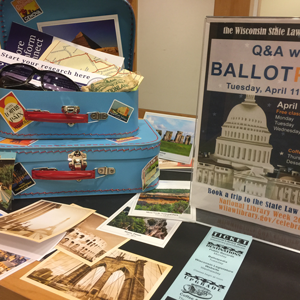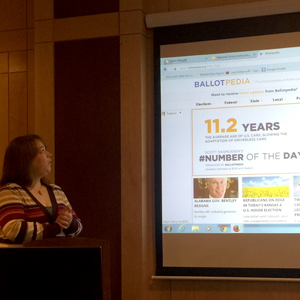WSLL @ Your Service May 2017
Contents
What's New - Kristina Martinez
National Library Week recap
National Library Week was held April 10-14 at the David T. Prosser Jr. State Law Library in Madison. Thank you for joining us last month, whether you grabbed a slice of pie, checked out our new public scanner, or attended an event. We had an overwhelming attendance at our CLE classes. Did you miss out on the CLE opportunities? Summer classes are currently posted on our Classes page.


Happy Birthday, Wisconsin State Law Library!
The Wisconsin State Law Library celebrated its 181st birthday on Wednesday, April 19. Birthday cake was available all day to those visiting the library. The library staff are committed to continuing the mission to provide the highest quality of professional expertise to the officers and employees of the state, attorneys, and the public.
State agency brown bag
Also on April 19th the library staff hosted fellow state agency librarians for the State Agency Brown bag lunch. State agency librarians gather monthly to focus on an area of librarianship and share news and resources from their own libraries. This month was focused on outreach and event planning with a presentation by Kristina Martinez, Outreach Services Librarian.
May library closures
The David T. Prosser Jr. State Law Library and Milwaukee and Dane County Law Libraries will be closed on Monday, May 29th for Memorial Day. We will respond to questions and requests on Tuesday, May 30th.
To submit a question to the Wisconsin State Law Library while we are closed, you may call us at 608-267-9696 or Ask a Librarian online.
This Just In - Amy Crowder
New Title! Sexual Orientation, Gender Identity, and the Law in a Nutshell, by Ruth Colker
West Academic Publishing, 2017
Call Number: KF4754.5.C65 2017
Written to help attorneys better understand federal, state, and local laws affecting the lesbian, gay, bisexual and transgender communities. Laws that are discussed include Title VII of the Civil Rights Act of 1964; Title IX; the Fair Housing Act; the Affordable Care Act; Don't Ask, Don't Tell; and Defense of Marriage Act, as well as anti-gay rights measures adopted in individual states.
Chapters include:
- Regulation of sexuality, gender identity and expression, parenthood, and marriage
- The United States military
- Federal, state and local nondiscrimination laws
- Freedom of expression and association
- Religious freedom
New Title! International Aspects of U.S. Litigation: A Practitioner's Deskbook, edited by James E. Berger
American Bar Association, 2017
Call Number: KF413.J87 I58 2017
This set addresses the issues which may cause practitioners confusion when international disputes end up in the United States court system. The book offers contributions from several authoritative authors and is divided into five parts:
- Part I. Jurisdiction of state and federal courts; subject matter and personal jurisdiction; venue; forum non conveniens; service of process; parallel proceedings in the U.S. and foreign courts; forum selection clauses; and alien tort statute
- Part II. Governing law
- Part III. Discovery and issues of obtaining discovery abroad; privilege and choice of law; recognition and enforcement of foreign judgments in the U.S.
- Part IV. Judgment
- Part V. An overview of federal and state arbitration law and the commencement of arbitration. The New York convention and the Panama convention
- Part VI. Sovereign litigation, bankruptcy, and trade disputes

![]() See our latest New Titles list for a list of new books and other resources.
See our latest New Titles list for a list of new books and other resources.
For assistance in accessing these or other resources, please contact our Reference Desk.
Tech Tip - Heidi Yelk
Get ready for World Password Day
World Password Day is May 4. Experts recommend four steps to protect your digital assets: strong passwords, different passwords for each site, password managers, and multi-factor authentication. Most of us are familiar with steps one and two. Steps three and four are less familiar.
Password managers - what are they? How do they work? This article by April Glaser at Wired is a great introduction to free password managers, which essentially serve as a "vault" to keep (and even generate) all your passwords. PC Magazine goes a step further with this chart comparing fee-based password managers - the "best password managers of 2017."
Two or multi-factor authentication is something we all use but don't always think about (other than to complain that a machine is asking for one more piece of information). As explained here, it could be the zip code attached to your credit card or a code sent to your phone. Two-factor authentication is often forced upon you or it could be an "opt-in" choice you can make with certain websites. Security experts recommend opting in.
Privacy gets a whole week
Also happening in May, is ALA's annual Choose Privacy Week. To mark this week, you may wish to try a different search engine: DuckDuckGo bills itself as "the search engine that doesn't track you." It does not store search history therefore cannot sell any personal information to advertisers. For quick access, DuckDuckGo is available as an add-on to Firefox.
Another reason to try it: DuckDuckGo has an easy to use site search called "bangs" which saves time. For example, to search Twitter from DuckDuckGo, precede the search with !Twitter; to search Wikipedia, !w. Thousands of sites can be directly searched. See this listing as well as specific categories, such as law; newspapers; government; reference and Google services.
Information literacy (Fake News) - Jaime Healy-Plotkin

Fake news is not a new phenomenon (see Washington Post opinion article, "Fake news? That's a very old story." by Robert G. Parkinson, November 25, 2016) and can be construed as humorous (see The Onion). The most recent election raised issues that the library profession takes very seriously. Librarians hope to educate patrons on finding credible and reliable sources. The following resources relate to information literacy and explore the emergent issue of fake news coming into the courts.
According to the American Library Association, information literacy is a set of abilities requiring individuals to "recognize when information is needed and have the ability to locate, evaluate, and use effectively the needed information." When in doubt, contact the librarians at the Wisconsin State Law Library to assist in your research.
Educational resources
- Alternative Facts and Fake News - Verifiability in the Information Society (International Federation of Library Associations and Institutions, January 27, 2017).
- How To Spot Fake News graphic
- How to Spot Fake News, Eugene Kiely and Lori Robertson November 18, 2016.
- Evaluating Information: The Cornerstone of Civic Online Reasoning (Stanford History Education Group, 2016).
- Post-Truth: Fake News and a New Era of Information Literacy (American Library Association Webinar, February 22, 2017).
- Evaluating Information - Applying the CRAAP Test (Meriam Library, California State University)
- Show Me the Learning: Navigating Information on Literacy through Multiple Life Perspectives, Alice B. Ruleman, Laura Horne-Popp, and Robert Hallis - Principles based on recommendations from the Association of Colleges and Research Libraries.
- Includes this graphic: The CRAAP Test
- Librarians, Information Literacy, and Fake News, Kathy Stein-Smith, Strategic Library, Issue 37, March 15, 2017.
- Truth, truthiness, triangulation: A news literacy toolkit for a "post-truth" world, Joyce Valenza , November 26, 2016.
- False, Misleading, Clickbait-y, and/or Satirical "News" Sources, Melissa Zimdars, 2016.
Law reviews
- Fake News, Free Speech, & The Third-Person Effect: I'm No Fool, But Others Are, Clay Calvert, 7 Wake Forest L. Rev. Online 12 (2017).
In the news
- Here's Why Facebook and Google Can't Fix the Fake News Problem, Mathew Ingram, March 29, 2017.
- Evaluating Sources in a ‘Post-Truth' World: Ideas for Teaching and Learning About Fake News, Katherine Schulten and Amanda Christy Brown, Jan. 19, 2017.
- What's the Legal Definition of "Fake News?" One Newspaper Publisher Might Sue to Find Out, Franziska Kues, Poynter, March 29, 2017.
Case law
- D Magazine Partners, L.P. v. Rosenthal, No. 15-0790 (Tex. Sup. Ct. 2017 ).
- Federal Trade Commission v. LeadClick Media, 838 F.3d 158.
- Self-Proclaimed Publisher of Fake News Sites Loses Circuit Appeal, Shari Claire Lewis, Dec. 19, 2016.
Comments Welcome!
- Contact Kristina Martinez
608-267-2202
Keep Up With Current News
- Weekly updates with Library Highlights
 Subscribe to our Newsletter RSS Feed
Subscribe to our Newsletter RSS Feed


